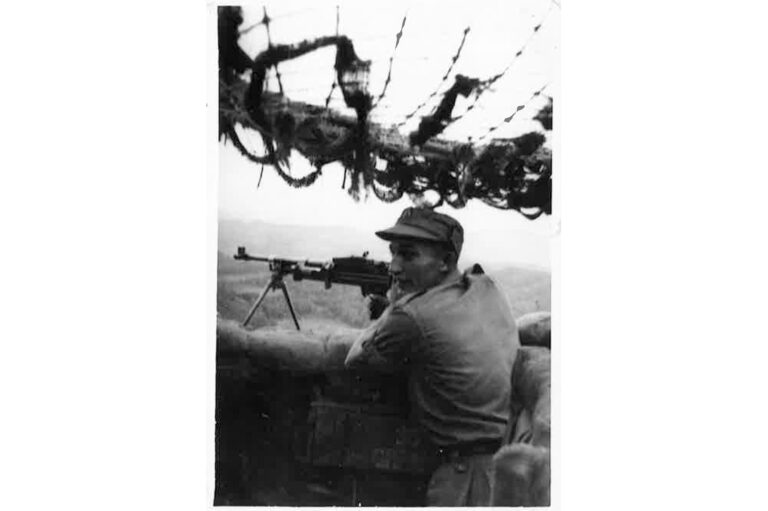
Urban Vermette crossed the Pacific to fight for Canada not once, but twice, and on Friday, the Prince Albert veteran will be honoured posthumously for the second of those two deployments.
Vermette, a Métis veteran of both the Second World War and Korean War, passed away in 1984. On Friday, however, three family members will be in Ottawa to accept the Korean Ambassador for Peace Medal on his behalf.
“Freedom is not free,” Vermette’s son Donald said during an interview prior to the ceremony. “Sometimes we have to fight for it, as history tells us … and it’s sad that a lot of these guys were teenagers. A lot of them died over there and they never had a chance to become a husband and a father or see their grandchildren. They’re laying all over the world, so it’s a great please to receive the award on behalf of my dad and guys like him.”
Urban volunteered for the Korean War in 1951, but rarely talked about his experiences. Donald remembered his father as a calm, likeable man, who, rarely talked about his service in Korea and the Second World War, like many Prince Albert veterans.
“They seemed to have a quietness among them,” Donald remembered. “They stuck together. They didn’t socialize too much with people who weren’t veterans.”
Urban’s nephews, Albert and Harvey Vermette, will join Donald at the ceremony in Ottawa. Albert said he was happy to see his uncle acknowledged by the Republic of Korea.
“It shows recognition for what they did,” Albert explained. “I truly believe that they are coming to grips with the idea that there were many soldiers from all over the world who participated and gave their life for the freedom of South Korea.”
Republic of Korea ambassador Keung Ryong Chang will present the medal along with Canadian senator Yonah Martin—the first Canadian senator of Korean descent. The medal is an expression of appreciation from the Korean government to Canadian service men and women who served in the Korean War, which ran from 1950 to 1953. It is also awarded to veterans who participated in peacekeeping operations in the country until 1955.
Both Donald and Albert said they’re glad to see Korean War veterans getting more recognition, and they’re proud of Urban for the role he played.
“It’s amazing that a human being can take that mental distress and function in that type of situation again,” Donald said. “I figure, personally, that he paid a great price for that, because he came back a different man.”
“Upon getting back, he never really had a normal life,” Albert added. “He was never really himself.”
Urban’s service in Korea was the second time he travelled to Asia to fight for Canada. He also fought in Hong Kong during the Second World War with the 1st Battalion of The Winnipeg Grenadiers.
Like many Canadians soldiers, Urban became a Japanese POW when the British, Canadian and Indian defenders were forced to surrender on Christmas Day, 1941. He spent the next four years shuttling between prison camps before being liberated on Aug 18, 1945.
When he finally returned home to Prince Albert in 1946, well-wishers hoisted him on their shoulders, and the City threw him a parade. Newspaper reports at the time say he was the first Saskatchewan POW to return home from the Japanese prison camps. He was 23-years-old at the time.
Although was able to talk with newspaper reporters during the trip home about his experience as a POW, Urban’s experience had a devastating effect on him. He often had nightmares and flashbacks.
“He would talk about how they were treated, him and his cousin,” Albert said. “He owed what he thought was a debt of gratitude to a Japanese doctor. He felt this doctor took a liking to him and our cousin, and it was because of him that they survived the Japanese war camp.
“My uncle suffered a lot, not only at the hands of the Japanese, but in the way he was treated by the government when he came home from World War Two,” Albert added. “It forced him, basically, to go back to Korea, because he didn’t feel like he did enough for his country.”
Local newspaper stories at the time reported that more than 1,000 residents came out to welcome Urban back to Prince Albert. He told reporters about being forced to work in sweltering conditions in underground mines, where prisoners would collapse after only a few minutes due to heat and exhaustion. His weight during captivity dropped to around 130 pounds.
He also told reporters about being forced to work on a construction crew, pouring concrete for a new airport runway. Urban said the Canadians attempted to sabotage the project by mixing large amounts of sand into the concrete when their captors weren’t looking.
He also described humiliating penalties for minor miscues, like accidently breaking a rice bowl. He said the Canadians had to develop a good sense of humour to make it through their punishments.
“I am very much in the dark about what has gone on in Canada in the last four years,” Urban told reporters. “The last I knew of my two brothers, Delor and Walter, was that they were in the army in England.”
Despite the many challenges, Urban remained optimistic.
“I have always felt that I would be home again, and that the Japanese would never get me,” he said.
